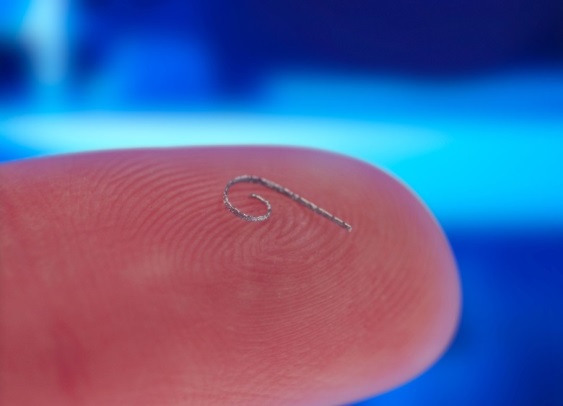Sustainability is our Focus – LZH at the Hannover Messe 2014

Laser additive manufacturing at the Hannover Messe: Cochlea implant made using SLµM. (© LZH)
The LZH is presenting at this year’s Hannover Messe, under the theme of “Sustainability is our Focus – Laser-based Production Cycles”, how laser technology can save energy and/or material during production, processing and repair and recycling.
Manufacturing: Production “out of the blue”
Laser Additive Manufacturing (LAM) can be used to produce individual workpieces in only one step. The left over material can usually be used for new production cycles. Using special materials is in particular interesting for the biomedical field. Bioresorbable magnesium implants and micro-actuators made of shape memory alloys can be used for new healing approaches. Polymer-workpieces with high resolutions make prototypes and small series production of tools and special machines possible. Fair visitors can see how an LAM unit functions, which materials can be used, and what the finished workpieces can be used for.
Processing: Saving Time, Processing Steps and Raw Materials
Hybrid welding can be used for more precise and faster processing of metal workpieces. From pipeline building to coating of tools, laser based processes save work steps and materials. Even fiber composites can be precisely processed using lasers. The LZH is currently doing research on automated cutting of these lightweight materials, so that they can soon be used for mass production for automobile and aviation construction in the future.
Repair and Recycling: Extending the Lifetime of Lightweight Materials
Damage to wind power systems and aircraft wings can be selectively ablated and repaired using the laser, so that a whole rotor or wing need not be replaced. At the LZH stand, visitors can see how laser technology can be used to shorten the repair time and save material for leading-edge slats of a CFRP airplane wing. Visitors can also learn how CFRP cuttings can be recycled for use in new materials.
Visit the LZH at the joint stand of the state of Lower Saxony in hall 2, stand A 08!
Would you like to make an appointment with one of our experts?
Marketing & Communications
Dipl.-Biol. Lena Bennefeld
Phone: +49 511 2788-238
Fax: +49 511 2788-100
E-Mail: l.bennefeld@lzh.de
Laser Zentrum Hannover e.V. (LZH)
As an independent, non-profit research institute, the Laser Zentrum Hannover e.V. (LZH) stands for innovative research, development and consulting. The LZH is supported by the Lower Saxony Ministry for Economics, Labour and Transport and is dedicated to the selfless promotion of applied research in the field of photonics and laser technology. Founded in 1986, over 170 staff have achieved a turnover of 15.993 million euros (for 2013), among others, from income from federal, state, EU and industrial projects.
The focus of the LZH lies on the fields of optical components and systems, optical production technologies, and biomedical photonics. Interdisciplinary cooperation between natural scientists and mechanical engineers makes innovative approaches to challenges from the most different areas possible: from the development of components for specific laser systems to process developments for the most diverse laser applications, for example for medical technology or lightweight construction in the automotive sector. Seventeen spin off companies have emerged from the LZH up to now. Thus, the LZH has created a strong transfer between fundamental science, application oriented research, and industry.
Media Contact
All latest news from the category: HANNOVER MESSE
Newest articles
Faster, more energy-efficient way to manufacture an industrially important chemical
Zirconium combined with silicon nitride enhances the conversion of propane — present in natural gas — needed to create in-demand plastic, polypropylene. Polypropylene is a common type of plastic found…

Energy planning in Ghana as a role model for the world
Improving the resilience of energy systems in the Global South. What criteria should we use to better plan for resilient energy systems? How do socio-economic, technical and climate change related…

Artificial blood vessels could improve heart bypass outcomes
Artificial blood vessels could improve heart bypass outcomes. 3D-printed blood vessels, which closely mimic the properties of human veins, could transform the treatment of cardiovascular diseases. Strong, flexible, gel-like tubes…





















